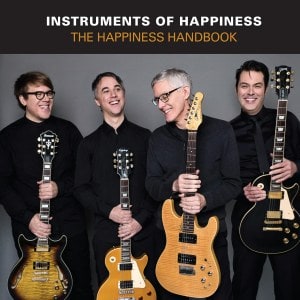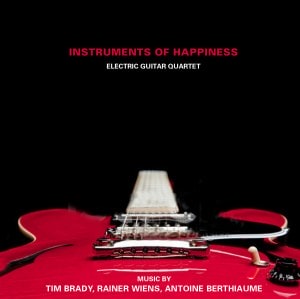This CD from the virtuosic electric-guitar quartet Instruments of Happiness presents the premiere recordings of works from Scott Godin, Tim Brady, Jordan Nobles, Maxime McKinley, Gordon Fitzell, and Emily Hall.
Listeners will hear edgy minimalism and jagged rhythms; calmly flowing harmonies and aggressively noisy textures; eerie slide guitar and dreamy harmonics; as well as rapid tremolando, hammered-on notes, and pounding chords. Listeners will also hear references to: progressive rock and hoedown music; the blues and flamenco; and Duane Eddy and Link Wray guitar classics.
The CD opens with Scott Godin’s Martlandia (2016), which pays homage to the British composer, educator, and activist Steven Martland, who died in 2013. The work “builds on Martland’s eclectic sound world in fascinating ways, and opens the album with a hint of the electric guitar’s flexibility” (Kozinn). Godin writes, “questions of pulse and harmony predominate,” while the piece “evokes images of Martland’s varied stylistic output, combining the world of hard-edged European minimalism (Martland’s eclectic enthusiasm for rock music and strong socialist principles) with an emblematically English tonal palette.” Martlandia presents calm, flowing harmonies; many rhythmic and melodic contrasts; and references to hoedown music, progressive rock, and minimalism.
Tim Brady describes his Equal But Opposite Reaction (2016) as “a highly rhythmic work, often exploring extended call and response/canonic textures in order to create a kaleidoscopic formal development. Every chord provokes a response, every melody has a counterpoint, every sound elicits a contrasting noise or a silence: in this work, for every gesture, there is an equal but opposite reaction. It is also meant to be fun to play.”
Jordan Nobles notes that Deep Field (2016) “was inspired by, and named after, the iconic Hubble Space Telescope image,” in which an “empty pinpoint of space was revealed to be populated with a stunning display of thousands of diverse galaxies of various ages, sizes, shapes, and colors.” Kozinn finds that Deep Field “takes musical form in a texture that is as mysterious as its inspiration, with disparate influences – a solo line, near the end, that combines the accents of flamenco and the blues, for example – gracefully intertwined.”
Reflets de Francesca Woodman (2017) is an homage to the celebrated American photographer, born in Denver in 1958 and raised in Boulder, who unfortunately took her life at age 22 in New York City. Maxime McKinley writes, “Woodman’s work was principally characterized by staged environments, often using mirrors, where the distinction between herself and her surroundings was often blurred by the play of light and its multiple diffractions. The instrumentation of the electric guitar quartet gave me the idea of working with a similar sense of sonic refraction, splitting apart and recombining musical figures. I was also inspired by the many emotions I feel when I look at Woodman’s photographs, ranging from melancholy to playfulness.” Kozinn remarks, “Sonic space is used to superb effect in Maxime McKinley’s Reflets de Francesca Woodman, which begins with a passage in dreamy harmonics and embraces everything from driven, jagged rhythms and eerie slide guitar passages to the timbres and moves of early 1960s Duane Eddy and Link Wray guitar epics, before melting into a meditative, melancholy haze.”
“The imagery in the title of Gordon Fitzell’s Bomb Crater Garden (2016) makes the point that lovely things can emerge in the wake of terrible ones, a notion that forms here as the guitar quartet’s aggressively noisy, tense texture melts, in the final pages, into an evocation of distant bird song” (Kozinn). The composer comments that “the music is intended to serve in part as a vessel into which an endless variety of extramusical ideas may breathe new energy and life. Examples of such ideas include prison poetry, wartime correspondence, tales of harboring the persecuted, and accounts of cultural performances within the walls of concentration camps.”
The CD concludes with the eponymous multi-movement work by Emily Hall. Kozinn writes that this “light-textured, richly inventive work, The Happiness Handbook (2017), plays on the ensemble’s name and celebrates the sheer joy of making an electric guitar (or four) sing, dance, whisper or roar. Hall covers a vast amount of ground in the work’s five movements, among them, sustained tones, swirling figures, fast-picked tremolando, hammered-on notes, thundering chords, and the tactile complexities that tape delay brings to plucked tones and their attendant percussive attacks. It is, in its entertaining way, a perfect summation of the album’s joys – a ‘Happiness Handbook’ indeed.”
The album follows the group’s highly successful debut CD (“Instruments of Happiness,” ST-224) released by Starkland in 2016, which received over a dozen excellent reviews.
About Instruments Of Happiness
Instruments of Happiness is a variously configured electric-guitar ensemble created for the wide-ranging projects of composer/guitarist Tim Brady. The ensemble performs in three sizes: a quartet performing not only works from Brady but also numerous compositions commissioned for the group; a 20-piece professional guitar “orchestra”; and a 100-piece guitar ensemble comprised of 20 professional and 80 community players performing new, site-specific works. Brady writes, “For over thirty years I have been exploring a new approach to the electric guitar, a vision as both a composer and a guitarist. Instruments of Happiness is, to a great extent, the next step in this evolution.”
The quartet focuses on chamber music and encouraging the creation of new repertoire for this instrumentation. They explore the staggeringly large range of musical ideas available to the electric-guitar quartet: classic chamber music, warm jazz sounds, crunchy blues tones, straight-up rock energy, full-on experimental sonic chaos, and floating, serene soundscapes.
The 100-piece ensemble has created four large-scale productions: the first, in 2015 at the Festival Montréal/Nouvelles Musiques; a performance at the Modulus Festival (Vancouver); a Stratford Summer Music Festival (Ontario) performance; and, in 2018, the premiere of a newly-commissioned work at the Luminato festival in Toronto. All productions are available on YouTube, attracting a wide viewership
Starkland’s previous debut recording of Instruments of Happiness was exceptionally well received. Fulfilling “all the open promises between the meeting of post-minimalism and art rock” (Brooklyn Rail), the CD was a Philadelphia Inquirer Classical Pick and landed on several Best-of-the-Year lists. The album premiered two major works from Brady (The Same River Twice: Symphony #5.0 and The Same River Twice: Symphony #5.Solo), as well as the first recordings of Antoine Berthiaume’s Fungi and Rainer Wiens’ What is Time?.








